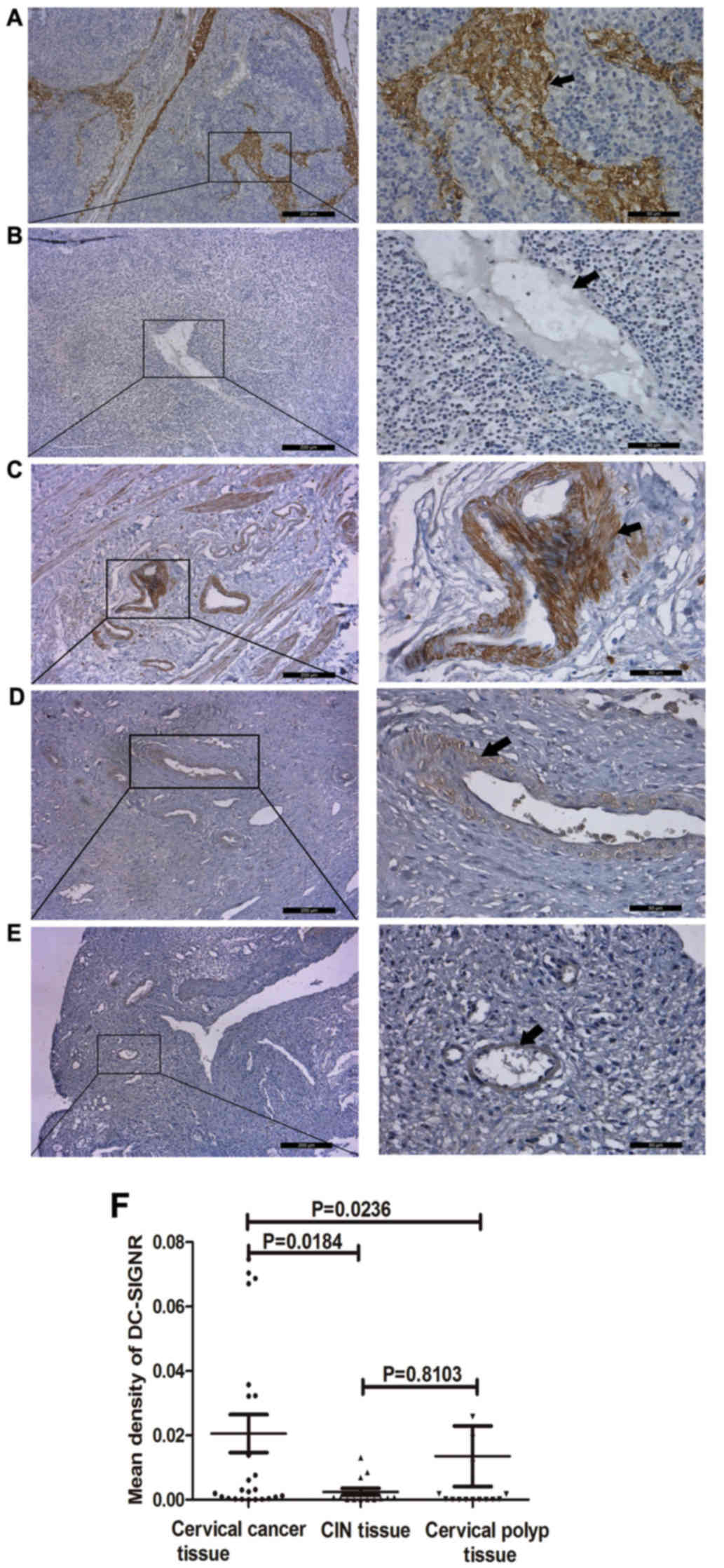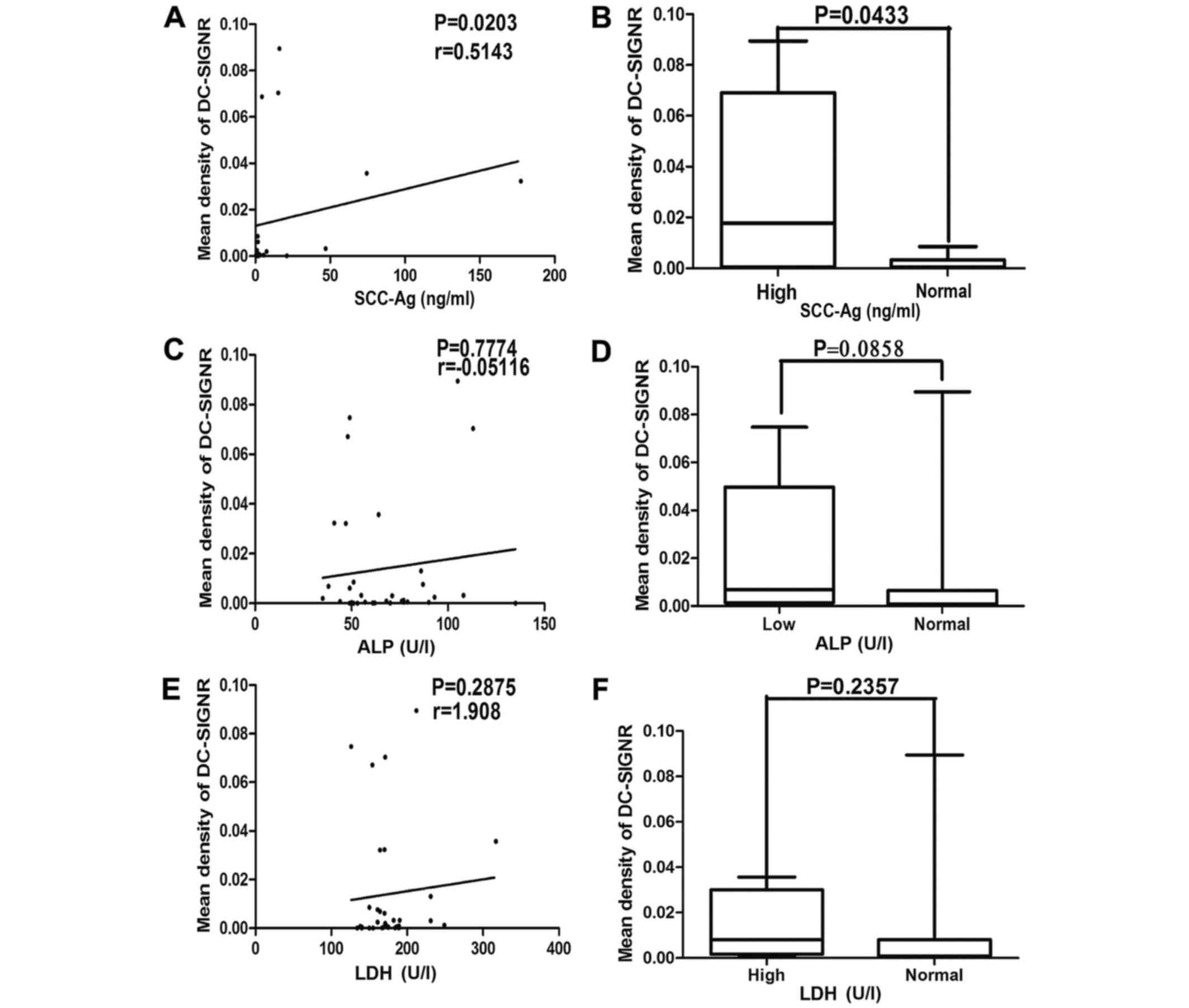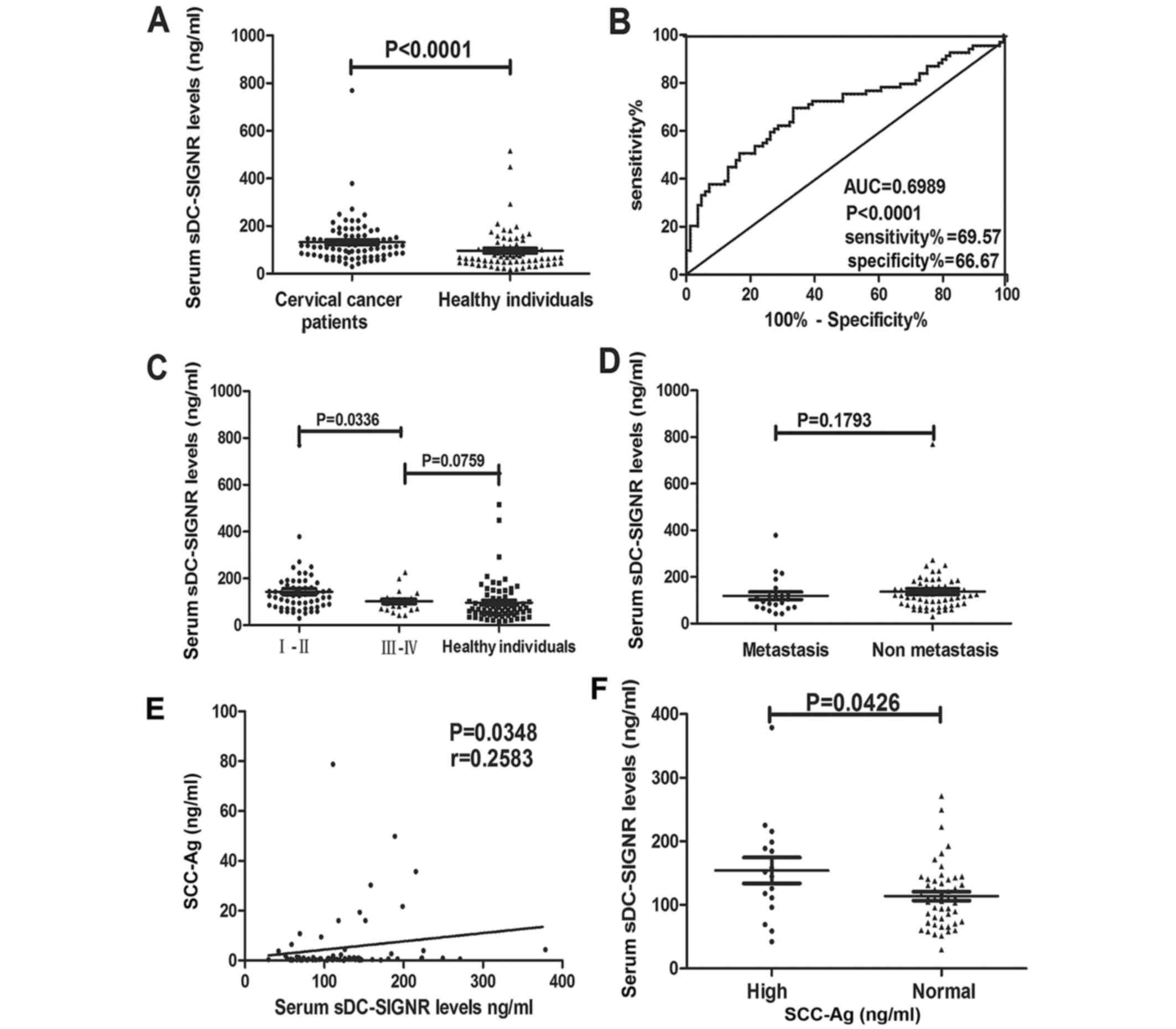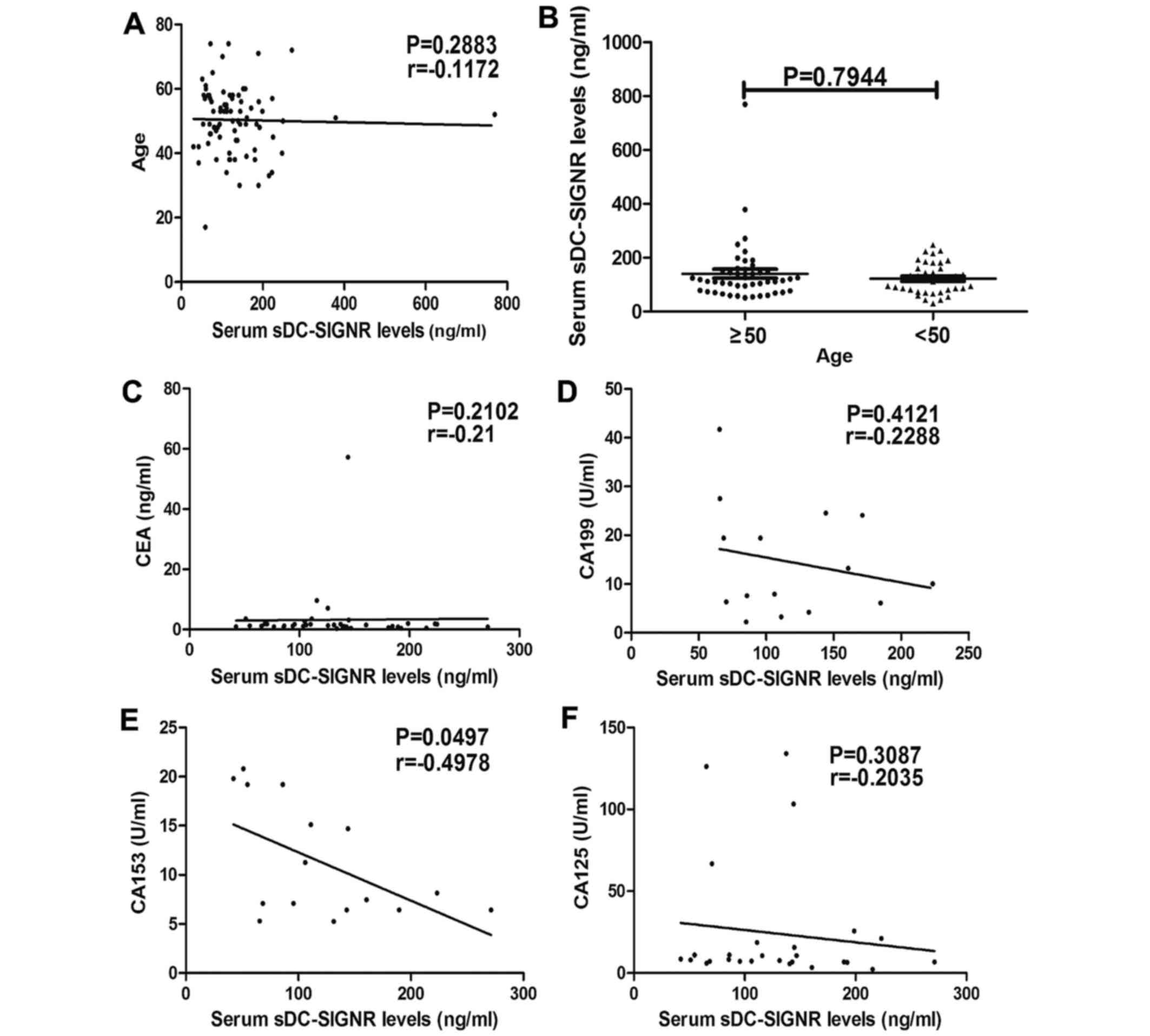|
1
|
Parkin DM and Bray F: Chapter 2: The
burden of HPV-related cancers. Vaccine. 24 Suppl 3:3/11–25. 2006.
View Article : Google Scholar
|
|
2
|
Arbyn M, Castellsagué X, de Sanjosé S,
Bruni L, Saraiya M, Bray F and Ferlay J: Worldwide burden of
cervical cancer in 2008. Ann Oncol. 22:2675–2686. 2011. View Article : Google Scholar : PubMed/NCBI
|
|
3
|
World Health Organization, . Comprehensive
Cervical Cancer Control: A Guide to Essential Practice. 2nd. World
Health Organization; Geneva, Switzerland: 2014
|
|
4
|
Mzarico E, Gómez-Roig MD, Guirado L,
Lorente N and Gonzalez-Bosquet E: Relationship between smoking, HPV
infection, and risk of cervical cancer. Eur J Gynaecol Oncol.
36:677–680. 2015.PubMed/NCBI
|
|
5
|
Ahmed HG, Bensumaidea SH and Ashankyty IM:
Frequency of human papillpoma virus (HPV) subtypes 31,33,35,39 and
45 among Yemeni women with cervical cancer. Infect Aqent Cancer.
10:292015. View Article : Google Scholar
|
|
6
|
Hildesheim A and Wanq SS: Host and viral
genetics and risk of cervical cancer: A review. Virus Res.
89:229–240. 2002. View Article : Google Scholar : PubMed/NCBI
|
|
7
|
Luo Q, Zhang S, Wei H, Pang X and Zhang H:
Roles of Foxp3 in the occurrence and development of cervical
cancer. Int J Clin Exp Pathol. 8:8717–8730. 2015.PubMed/NCBI
|
|
8
|
Dambuza IM and Brown GD: C-type lectins in
immunity: Recent developments. Curr Opin Immunol. 32:21–27. 2015.
View Article : Google Scholar : PubMed/NCBI
|
|
9
|
Strenq-Ouwehand I, Unqer WW and Van Kooyk
Y: C-type lectin receptors for tumor eradication: Future
directions. Cancers (Basel). 3:3169–3188. 2011. View Article : Google Scholar : PubMed/NCBI
|
|
10
|
Laskarin G, Redzovic A, Vlastelic I,
Haller H, Medancic SS, Solinas G and Rukavina D: Tumor-associated
glycoprotein (TAG-72) is a natural ligand for the C-type
lectin-like domain that induces anti-inflammatory orientation of
early pregnancy decidual CD1a+ dendritic cells. J Reprod Immunol.
88:12–23. 2011. View Article : Google Scholar : PubMed/NCBI
|
|
11
|
Sancho D and e Sousa C Reis: Sensing of
cell death by myeloid C-type lectin receptors. Curr Opin Immunol.
25:46–52. 2013. View Article : Google Scholar : PubMed/NCBI
|
|
12
|
Geijtenbeek TB, van Vliet SJ, Enqering A,
't Hart BA and van Kooyk Y: Self-and nonself-recognition by C-type
lectins on dendritic cells. Annu Rev Immunol. 22:33–54. 2004.
View Article : Google Scholar : PubMed/NCBI
|
|
13
|
Soilleux EJ, Barten R and Trowsdale J:
DC-SIGN; a related gene, DC-SIGNR; and CD23 from a cluster on
19p13. J Immunol. 165:2937–2942. 2000. View Article : Google Scholar : PubMed/NCBI
|
|
14
|
Martens JH, Kzhyshkowska J,
Falkowski-Hansen M, Schledzewski K, Gratchev A, Mansmann U,
Schmuttermaier C, Dippel E, Koenen W, Riedel F, et al: Differential
expression of a gene signature for scavenger/lectin receptors by
endothelial cells and macrophages in human lymph node sinuses, the
primary sites of regional metastasis. J Pathol. 208:574–589. 2006.
View Article : Google Scholar : PubMed/NCBI
|
|
15
|
Jianq Y, Zhanq C, Chen K, Chen Z, Sun Z,
Zhang Z, Ding D, Ren S and Zuo Y: The clinical significance of
DC-SIGN and DC-SIGNR, which are novel markers expressed in human
colon cancer. PLoS One. 9:e1147482014. View Article : Google Scholar : PubMed/NCBI
|
|
16
|
Bieijs DA, Geijtenbeek TB, Fiqdor CG and
van Kooyk Y: DC-SIGN and LFA-1: A battle for ligand. Trends
Immunol. 22:457–463. 2001. View Article : Google Scholar : PubMed/NCBI
|
|
17
|
Lu S, Bevier M, Huhn S, Sainz J, Lascorz
J, Pardini B, Naccarati A, Vodickova L, Novotny J, Hemminki K, et
al: Genetic variants in C-type lectin genes are associated with
colorectal cancer susceptibility and clinical outcome. Int J
Cancer. 133:2325–2333. 2013. View Article : Google Scholar : PubMed/NCBI
|
|
18
|
Ding D, Chen W, Zhang C, Chen Z, Jiang Y,
Yang Z, Jiang X, Zuo Y and Ren S: Low expression of dendritic
cell-specific intercellular adhesion molecule-3-grabbing
nonintegrin in non-Hodgkin lymphoma and a significant correlation
with β2-microglobulin. Med Oncol. 31:2022014. View Article : Google Scholar : PubMed/NCBI
|
|
19
|
Liu W, Tang L, Zhang G, Wei H, Cui Y, Guo
L, Gou Z, Chen X, Jiang D, Zhu Y, et al: Characterization of a
novel C-type lectin-like gene, LSECtin: Demonstration of
carbohydrate binding and expression in sinusoidal endothelial cells
of liver and lymph node. J Biol Chem. 279:18748–18758. 2004.
View Article : Google Scholar : PubMed/NCBI
|
|
20
|
Pöhlmann S, Soilleux EJ, Baribaud F,
Leslie GJ, Morris LS, Trowsdale J, Lee B, Coleman N and Doms RW:
DC-SIGNR, a DC-SIGN homologue expression in endothelial cells,
binds to human and simian immunodeficiency viruses and activates
infection in trans. Proc Natl Acad Sci USA. 98:pp. 2670–2675. 2001;
View Article : Google Scholar : PubMed/NCBI
|
|
21
|
Liu X, Zhanq H, Su L, Yang P, Xin Z, Zou
J, Ren S and Zuo Y: Low expression of dendritic cell-specific
intercellular adhesion molecule-grabbing nonintegrin-related
protein in lung cancer and significant correlations with brain
metastasis and natural killer cells. Mol Cell Biochem. 407:151–160.
2015. View Article : Google Scholar : PubMed/NCBI
|
|
22
|
Van de Lande J, Davelaar EM, von
Mensdorff-Pouilly S, Water TJ, Berkhof J, van Baal WM, Kenemans P
and Verheijen RH: SCC-Ag, lymph node metastases and sentinel node
procedure in early stage squamous cell cervical cancer. Gynecol
Oncol. 112:119–125. 2009. View Article : Google Scholar : PubMed/NCBI
|
|
23
|
Rauch GM, Kaur H, Choi H, Ernst RD, Klopp
AH, Boonsirikamchai P, Westin SN and Marcal LP: Optimization of MR
imaging for pretreatment evaluation of patients with endometrial
and cervical cancer. Radiographics. 34:1082–1098. 2014. View Article : Google Scholar : PubMed/NCBI
|
|
24
|
Pöhlmann S, Soilleux EJ, Baribaud F,
Leslie GJ, Morris LS, Trowsdale J, Lee B, Coleman N and Doms RW:
DC-SIGNR, a DC-SIGN homologue expressed in endothelial cell, binds
to human and simian immunodeficiency viruses and activates
infection in trans. Proc Natl Acad Sci USA. 98:pp. 2670–2675. 2001;
View Article : Google Scholar : PubMed/NCBI
|
|
25
|
Yulin Li: Pathology. 8th. People's Medical
Publishing House; Beijing: 2013, (In Chinese).
|
|
26
|
Bashirova AA, Geijtenbeek TB, van
Duijnhoven GC, van Vliet SJ, Eilering JB, Martin MP, Wu L, Martin
TD, Viebig N, Knolle PA, et al: A dendritic cell-specific
intercellular adhesion molecule 3-grabbing nonintegrin
(DC-SIGN)-related protein is highly expressed on human liver
sinusoidal endothelial cells and promotes HIV-1 infection. J Exp
Med. 193:671–678. 2001. View Article : Google Scholar : PubMed/NCBI
|
|
27
|
Mitchell DA, Fadden AJ and Drickamer K: A
novel mechanism of carbohydrate recognition by the C-type lectins
DC-SIGN and DC-SIGNR. Subunit organization and binding to
multivalent ligands. J Biol Chem. 276:28939–28945. 2001. View Article : Google Scholar : PubMed/NCBI
|
|
28
|
Op den Brouw ML, de Jonq MA, Ludwiq IS,
van der Molen RG, Janssen HL, Geijtenbeek TB and Woltman AM:
Branched oligosaccharide structures on HBV prevent interaction with
both DC-SIGN and L-SIGN. J Viral Hepat. 15:675–683. 2008.
View Article : Google Scholar : PubMed/NCBI
|
|
29
|
Soilleux EJ: DC-SIGN (dendritic
cell-specific ICAM-grabbing non-integrin) and DC-SIGN-related
(DC-SIGNR): Friend or foe? Clin Sci (Lond). 104:437–446. 2003.
View Article : Google Scholar : PubMed/NCBI
|
|
30
|
Chaudhary O, Kumar S, Bala M, Singh J,
Hazarika A and Luthra K: Association of DC-SIGNR expression in
peripheral blood mononuclear cells with DC-SIGNR genotypes in HIV-1
infection. Viral Immunol. 28:472–475. 2015. View Article : Google Scholar : PubMed/NCBI
|
|
31
|
Jeonq BK, Choi DH, Huh SJ, Park W, Bae DS
and Kim BG: The role of squamous cell carcinoma antigen as a
prognostic and predictive factor in carcinoma of uterine cervix.
Radiat Oncol J. 29:191–198. 2011. View Article : Google Scholar : PubMed/NCBI
|
|
32
|
Wang Y, Cui T, Du L, Xu X, Tian B, Sun T,
Han C, Zhao X and Jing J: The correlation between the serum
squamous carcinoma antigen and the prognosis of recurrent cervical
squamous carcinoma. J Clin Lab Anal. 31:2017. View Article : Google Scholar
|
|
33
|
Shimura K, Mabuchi S, Yokoi T, Sasano T,
Sawada K, Hamasaki T and Kimura T: Utility of serum squamous cell
carcinoma antigen levels at the time of recurrent cervical cancer
diagnosis in determining the opti mal treatment choice. J Gynecol
Oncol. 24:321–329. 2013. View Article : Google Scholar : PubMed/NCBI
|
|
34
|
Kim BG: Squamous cell carcinoma antigen in
cervical cancer beyond. J Gynecol Oncol. 24:291–292. 2013.
View Article : Google Scholar : PubMed/NCBI
|
|
35
|
Li X, Zhou J, Huanq K, Tang F, Zhou H,
Wang S, Jia Y, Sun H, Ma D and Li S: The predictive value of serum
squamous cell carcinoma antigen in patients with cervical who
receive neoadjuvant chemotherapy followed by radical surgery: A
single-institute study. PLoS One. 10:e01223612015. View Article : Google Scholar : PubMed/NCBI
|
|
36
|
Zhang Z, Chen K, Yan L, Yang Z, Zhu Z,
Chen C, Zeng J, Wei W, Qi X, Ren S and Zuo Y: Low expression of
dendritic cell-specific intercellular adhesion molecule-grabbing
nonintegrin-related protein in non-Hodgkin lymphoma and significant
correlations with lactic dehydrogenase and β2-microglobulin.
Biochem Cell Biol. 91:214–220. 2013. View Article : Google Scholar : PubMed/NCBI
|
|
37
|
Wulfkuhle JD, Liotta LA and Petricoin EF:
Proteomic applications for the early detection of cancer. Nat Rev
Cancer. 3:267–275. 2003. View
Article : Google Scholar : PubMed/NCBI
|
|
38
|
Gdowski A, Ranjan AP, Mukerjee A and
Vishwanatha JK: Nanobiosensors: Role in cancer detection and
diagnosis. Adv Exp Med Biol. 807:33–58. 2014. View Article : Google Scholar : PubMed/NCBI
|
|
39
|
Zuo Y, Ren S, Wanq M, Liu B, Yang J, Kuai
X, Lin C, Zhao D, Tang L and He F: Novel roles of liver sinusoidal
endothelial cell lectin in colon carcinoma cell adhesion, migration
and in-vivo metastasis to the liver. Gut. 62:1169–1678. 2013.
View Article : Google Scholar : PubMed/NCBI
|
|
40
|
Qian F, Hanahan D and Weissman IL:
L-selectin can facilitate metastasis to lymph nodes in a transgenic
mouse model of carcinogenesis. Proc Natl Acad Sci USA. 98:pp.
3976–3981. 2001; View Article : Google Scholar : PubMed/NCBI
|



















